- Home
- Paulo Coelho
Veronika Decides to Die: A Novel of Redemption Page 16
Veronika Decides to Die: A Novel of Redemption Read online
Page 16
"And why do they?"
"Because the Virgin equals female energy and is the mistress of the snake, which signifies wisdom. If you look at the ring Dr. Igor wears, you'll see that it bears the physician's symbol: two serpents coiled around a stick. Love is above wisdom, just as the Virgin is above the snake. For her everything is inspiration. She doesn't bother judging what is good and what evil."
"Do you know something else?" said Veronika. "The Virgin never took any notice of what others might think of her. Imagine having to explain to everyone that business about the Holy Ghost. She didn't explain anything, she just said: 'That's what happened.' And do you know what the others must have said?"
"Of course. That she was insane."
They both laughed. Veronika raised her glass.
"Congratulations. You should paint those visions of paradise rather than just talking about them."
"I'll begin with you," said Eduard.
Beside the small square there is a small hill. On top of the small hill there is a small castle. Veronika and Eduard trudged up the steep path, cursing and laughing, slipping on the ice, and complaining of exhaustion.
Beside the castle there is a gigantic yellow crane. To anyone coming to Ljubljana for the first time, the crane gives the impression that the castle is being restored and that work will soon be completed. The inhabitants of Ljubljana, however, know that the crane has been there for many years, although no one knows why. Veronika told Eduard that when children in kindergarten are asked to draw the castle of Ljubljana, they always include the crane in the drawing.
"Besides, the crane is much better preserved than the castle."
Eduard laughed.
"You should be dead by now," he said, still under the effects of alcohol, but with a flicker of fear in his voice. "Your heart shouldn't have survived that climb."
Veronika gave him a long, lingering kiss.
"Look at my face," she said. "Remember it with the eyes of your soul, so that you can reproduce it one day. If you like that can be your starting point, but you must go back to painting. That is my last request. Do you believe in God?"
"I do."
"Then you must swear by the God you believe in that you will paint me."
"I swear."
"And that after painting me, you will go on painting."
"I don't know if I can swear that."
"You can. And thank you for giving meaning to my life. I came into this world in order to go through: attempted suicide, ruining my heart, meeting you, coming up to this castle, letting you engrave my face on your soul. That is the only reason I came into the world, to make you go back to the path you strayed from. Don't make me feel my life has been in vain."
"I don't know if it's too early or too late, but, just as you did with me, I want to tell you that I love you. You don't have to believe it, maybe it's just foolishness, a fantasy of mine."
Veronika put her arms around him and asked the God she did not believe in to take her at that very moment.
She closed her eyes and felt him doing the same. And a deep, dreamless sleep came upon her. Death was sweet; it smelled of wine and it stroked her hair.
Eduard felt someone prodding him in the shoulder. When he opened his eyes, day was breaking.
YOU CAN go and shelter in the town hall, if you like," said the policeman. "You'll freeze if you stay here."
In a second Eduard remembered everything that had happened the previous night. There was a woman lying curled in his arms.
"She...she's dead."
But the woman moved and opened her eyes.
"What's going on?" asked Veronika.
"Nothing," said Eduard, helping her to her feet. "Or rather a miracle happened: another day of life."
As soon as Dr. Igor went into his consulting room and turned on the light--for daylight still arrived late and winter was dragging on far too long--a nurse knocked at his door.
THINGS HAVE started early today, he said to himself.
It was going to be a difficult day because of the conversation he would have to have with Veronika. He had been building up to it all week, and had hardly slept a wink the previous night.
"I've got some troubling news," said the nurse. "Two of the inmates have disappeared: the ambassador's son and the girl with the heart problem."
"Honestly, you're a load of incompetents, you are; not that the security in this hospital has ever been up to much."
"It's just that no one's ever tried to escape before," said the nurse, frightened. "We didn't know it was possible."
"Get out of here! Now I'll have to prepare a report for the owners, notify the police, take steps. Tell everyone I'm not to be disturbed; these things take hours!"
The nurse left, looking pale, knowing that a large part of that major problem would land on his own shoulders, because that is how the powerful deal with the weak. He would doubtless be dismissed before the day was out.
Dr. Igor picked up a pad, put it on the table, and began making notes; then he changed his mind.
He switched off the light and sat in the office precariously lit by the incipient sunlight, and he smiled. It had worked.
In a while he would make the necessary notes, describing the only known cure for Vitriol: an awareness of life. And describing the medication he had used in his first major test on patients: an awareness of death.
Perhaps other forms of medication existed, but Dr. Igor had decided to center his thesis around the one he had had the opportunity to experiment with scientifically, thanks to a young woman who had, quite unwittingly, become part of his fate. She had been in a terrible state when she arrived, suffering from a severe overdose, nearly in a coma. She had hovered between life and death for nearly a week, just the amount of time he needed to come up with a brilliant idea for his experiment.
Everything depended on one thing: the girl's capacity to survive.
And she had, with no serious consequences, no irreversible health problems; if she looked after herself, she could live as long as or longer than him.
But Dr. Igor was the only one who knew this, just as he knew that failed suicides tend to repeat the attempt sooner or later. Why not use her as a guinea pig, to see if he could eliminate the Vitriol from her organism?
And so Dr. Igor had conceived his plan.
Using a drug known as Fenotal, he had managed to simulate the effects of heart attacks. For a week she had received injections of the drug, and she must have been very frightened, because she had time to think about death and to review her own life. In that way, according to Dr. Igor's thesis (the final chapter of his work would be entitled "An Awareness of Death Encourages Us to Live More Intensely') the girl had gone on to eliminate Vitriol completely from her organism, and would quite possibly never repeat her attempt at suicide.
He was supposed to see her today and tell her that, thanks to the injections, he had achieved a total reversal of her heart condition. Veronika's escape saved him the unpleasant experience of lying to her yet again.
What Dr. Igor had not counted on was the infectious nature of his cure for Vitriol poisoning. A lot of people in Villete had been frightened by their awareness of that slow, irreparable death. They must all have been thinking about what they were missing, forced to reevaluate their own lives.
Mari had come to him asking to be discharged. Other patients were asking for their cases to be reviewed. The position of the ambassador's son was more worrisome, though, because he had simply disappeared, probably helping Veronika to escape.
Perhaps they're still together, he thought.
At any rate the ambassador's son knew where Villete was, if he wanted to come back. Dr. Igor was too excited by the results to pay much attention to minor details.
For a few moments he was assailed by another doubt: Sooner or later Veronika would realize that she wasn't going to die of a heart attack. She would probably go to a specialist who would tell her that her heart was perfectly normal. She would decide that the doctor who had
taken care of her in Villete was a complete incompetent; but then, all those who dare to research into forbidden subjects require both a certain amount of courage and a good dose of incomprehension.
But what about the many days that she would have to live with the fear of imminent death?
Dr. Igor pondered the arguments long and hard and decided that it didn't really matter. She would consider each day a miracle--which indeed it is, when you consider the number of unexpected things that could happen in each second of our fragile existences.
He noticed that the sun's rays were growing stronger; at that hour the inmates would be having breakfast. Soon his waiting room would be full, the usual problems would arise, and it was best to start taking notes at once for his thesis.
Meticulously he began to write up his experiment with Veronika; he would leave the reports on the building's lack of security until later.
St. Bernadette's Day, 1998
P.S. Insights, Interviews & More...
About the author
Meet Paulo Coelho
About the book
Paulo Coelho on the Inspiration Behind Veronika Decides to Die
About the author
Meet Paulo Coelho
PAULO COELHO was born in Rio de Janeiro in August 1947, the son of Pedro Queima Coelho de Souza, an engineer, and his wife Lygia, a homemaker. Early on Coelho dreamed of an artistic career, something frowned upon in his middle-class household. In the austere surroundings of a strict Jesuit school Coelho discovered his true vocation: to be a writer. Coelho's parents, however, had different plans for him. When their attempts to suppress his devotion to literature failed, they took it as a sign of mental illness. When Coelho was seventeen, his father twice had him committed to a mental institution where he endured sessions of electroconvulsive "therapy." His parents brought him to the institution once more after he became involved with a theater group and started to work as a journalist.
Coelho was always a nonconformist and a seeker of the new. In the excitement of 1968, the guerrilla and hippy movements took hold in a Brazil ruled by a repressive military regime. Coelho embraced progressive politics and joined the peace and love generation. He sought spiritual experiences by traveling all over Latin America in the footsteps of Carlos Castaneda. He worked in theater and dabbled in journalism, launching an alternative magazine called 2001. He began to collaborate as a lyricist with music producer Raul Seixas, transforming the Brazilian rock scene. In 1973 Coelho and Seixas joined the Alternative Society, an organization that defended the individual's right to free expression, and began publishing a series of comic strips calling for more freedom. Members of the organization were detained and imprisoned. Two days later Coelho was kidnapped and tortured by a paramilitary group.
This experience affected him profoundly. At the age of twenty-six Coelho decided that he had had enough of living on the edge and wanted to be "normal." He worked as an executive in the music industry. He tried his hand at writing, but didn't start seriously until after he had an encounter with a stranger. The man first came to him in a vision; two months later Coelho met him at a cafe in Amsterdam. The stranger suggested that Coelho should return to Catholicism and study the benign side of magic. He also encouraged Coelho to walk the Road to Santiago, the medieval pilgrim's route.
In 1987, a year after completing that pilgrimage, Coelho wrote The Pilgrimage. The book describes his experiences and his discovery that the extraordinary occurs in the lives of ordinary people. A year later Coelho wrote a very different book, The Alchemist. The first edition sold only nine hundred copies and the publishing house decided not to reprint it.
Coelho would not surrender his dream. He found another publishing house, a bigger one. He wrote Brida (a work still unpublished in English); the book received a lot of attention in the press, and both The Alchemist and The Pilgrimage appeared on bestseller lists.
Paulo went on to write many other bestselling books, including The Valkyries, By the River Piedra I Sat Down and Wept, The Fifth Mountain, Warrior of the Light: A Manual, Eleven Minutes, The Zahir, and The Devil and Miss Prym.
Today, Paulo Coelho's books appear at the top of bestseller lists worldwide. In 2002 the Jornal de Letras of Portugal, the foremost literary authority in the Portuguese language, bestowed upon The Alchemist the title of book with most copies sold in the history of the language. In 2003 Coelho's novel Eleven Minutes was the world's bestselling fiction title (USA Today, Publishing Trends).
In addition to his novels, Coelho writes a globally syndicated weekly newspaper column and occasionally publishes articles on current affairs. His newsletter, Warrior of the Light Online, has over seventy thousand subscribers.
Coelho and his wife, Christina Oiticica, are the founders of the Paulo Coelho Institute, which provides support and opportunities for underprivileged members of Brazilian society.
INTERNATIONAL ACCLAIM FOR
Veronika Decides to Die
"Veronika Decides to Die is Coelho's most artful work to date.... The different characters argue sanity and life from varying points of view, pulling the reader into discussion."
--Denver Post
"Told with sincerity approaching urgency, Coelho's novel is effective."
--Boston Globe
"A touching fable about learning to live in the face of death."
--Kirkus Reviews
"Coelho does not so much address his readers as confides in them. His style is a kind of eavesdropping, full of lyrical whisperings and confessional asides."
--The Sunday Express (London) "The global bestseller The Alchemist established Coelho's reputation, and Veronika Decides to Die is sure to reaffirm it."
--Time Out (London) "With Veronika Decides to Die Coelho's legend keeps growing."
--La Prensa (Argentina)
ALSO BY PAULO COELHO
The Alchemist
The Pilgrimage
The Valkyries
By the River Piedra I Sat Down and Wept
The Fifth Mountain
Warrior of the Light: A Manual
Eleven Minutes
The Zahir
The Devil and Miss Prym
Credits
Cover design by Doreen Louie
Cover photograph (c) 2000 by Gary Isaacs/Photonica
Copyright
This book is a work of fiction. The characters, incidents, and dialogue are drawn from the author's imagination and are not to be construed as real. Any resemblance to actual events or persons, living or dead, is entirely coincidental.
VERONIKA DECIDES TO DIE. Copyright (c) 2006 by Paulo Coelho. All rights reserved under International and Pan-American Copyright Conventions. By payment of the required fees, you have been granted the non-exclusive, non-transferable right to access and read the text of this e-book on-screen. No part of this text may be reproduced, transmitted, down-loaded, decompiled, reverse engineered, or stored in or introduced into any information storage and retrieval system, in any form or by any means, whether electronic or mechanical, now known or hereinafter invented, without the express written permission of HarperCollins e-books.
EPub (c) Edition JUNE 2006 ISBN: 9780061835438
10 9 8 7 6 5 4 3 2
About the book
Paulo Coelho on the Inspiration Behind Veronika Decides to Die
"'So you're going to give me electric shock treatment,' I said to Dr. Benjamim Gaspar Gomes."
I entered a tiled cubicle. There was a bed covered with a rubber sheet and beside the bed some sort of apparatus with a handle.
"So you're going to give me electric shock treatment," I said to Dr. Benjamim Gaspar Gomes.
"Don't worry. It's far more traumatic watching someone being treated than actually having the treatment yourself. It doesn't hurt at all."
I lay down and the male nurse put a kind of tube in my mouth so that my tongue wouldn't roll back. Then on either temple he placed two electrodes, rather like the earpieces of a telephone.
I was looking up at the
peeling paint on the ceiling when I heard the handle being turned. The next moment a curtain seemed to fall over my eyes; my vision quickly narrowed to a single point, and then everything went dark.
The doctor was right; it didn't hurt at all.
THE SCENE I HAVE JUST DESCRIBED is not taken from my latest book. It comes from the diary I wrote during my second stay in a mental hospital. That was in 1966, the beginning of the blackest period of Brazil's military dictatorship (1964-1989). As if by some natural reflex of the social mechanism, that external repression was gradually becoming internalized (not unlike what is happening in the United States today, where a man doesn't even dare look at a woman without having a lawyer by his side). So much so that good middle-class families found it simply unacceptable that their children or grandchildren should want to be "artists." In Brazil at that time, the word "artist" was synonymous with homosexual, communist, drug addict, and layabout.
When I was eighteen I believed that my world and that of my parents could coexist peacefully. I did my best to get good marks at the Jesuit school where I was studying. I worked every afternoon, but at night I wanted to live out my dream of being an artist. Not knowing quite where to begin, I became involved in an amateur theater group. Although I had no desire to act professionally, at least I was among people with whom I felt some affinity.
Unfortunately, my parents did not share my belief in the peaceful coexistence of two such diametrically opposed worlds. One night I came home drunk, and the following morning I was woken by two burly male nurses.
"You're coming with us," one of them said.
My mother was crying and my father was doing his best to hide any feelings he might have had.
"It's for your own good," he said. "We're just going to have some tests done."
And thus began my journey through various psychiatric hospitals. I was admitted, I was given all kinds of different treatments, and I ran away at the first opportunity, traveling around for as long as I could bear it then going back to my parents' house. We enjoyed a kind of honeymoon period, but after a while I again started to get into what my family called "bad company," and the nurses reappeared.

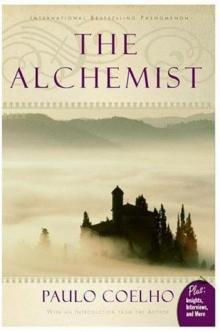 The Alchemist
The Alchemist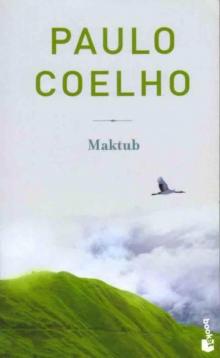 Maktub
Maktub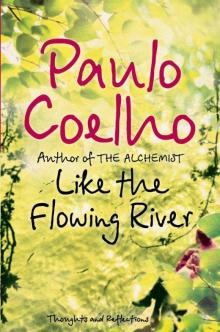 Like the Flowing River
Like the Flowing River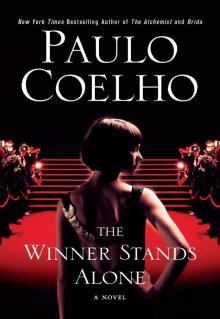 The Winner Stands Alone
The Winner Stands Alone The Spy
The Spy By the River Piedra I Sat Down and Wept: A Novel of Forgiveness
By the River Piedra I Sat Down and Wept: A Novel of Forgiveness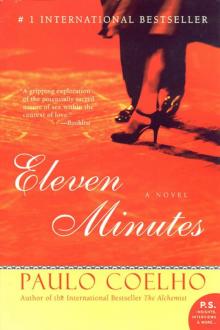 Eleven Minutes
Eleven Minutes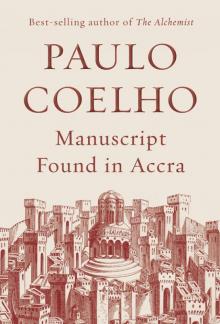 Manuscript Found in Accra
Manuscript Found in Accra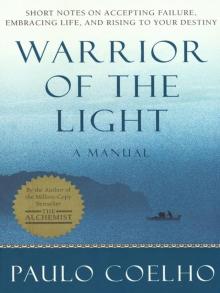 Warrior of the Light
Warrior of the Light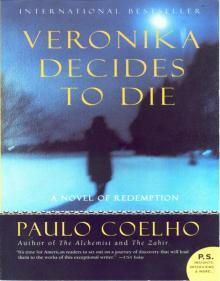 Veronika Decides to Die: A Novel of Redemption
Veronika Decides to Die: A Novel of Redemption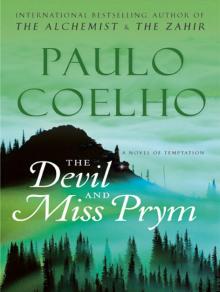 The Devil and Miss Prym: A Novel of Temptation
The Devil and Miss Prym: A Novel of Temptation The Valkyries: An Encounter With Angels
The Valkyries: An Encounter With Angels Brida: A Novel
Brida: A Novel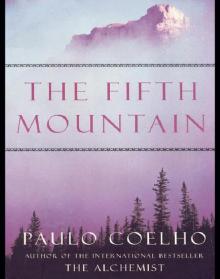 Fifth Mountain: A Novel
Fifth Mountain: A Novel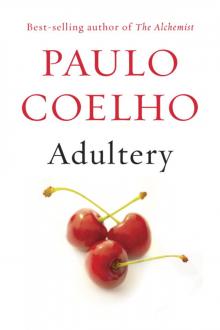 Adultery
Adultery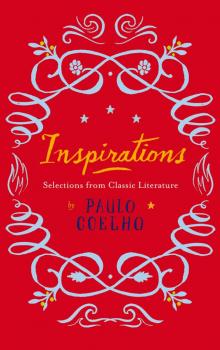 Inspirations
Inspirations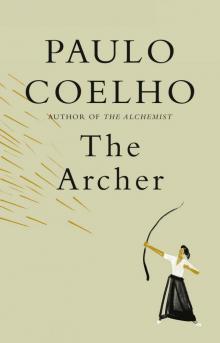 The Archer
The Archer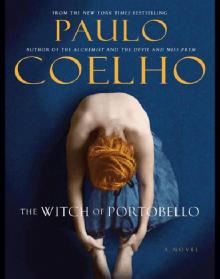 The Witch of Portobello
The Witch of Portobello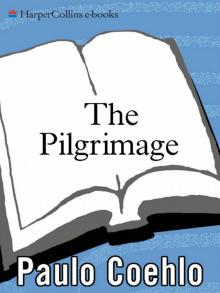 The Pilgrimage
The Pilgrimage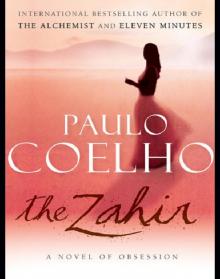 The Zahir
The Zahir Brida
Brida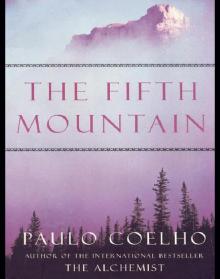 The Fifth Mountain
The Fifth Mountain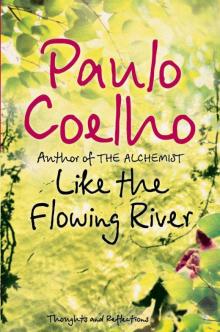 Like the Flowing River: Thoughts and Reflections
Like the Flowing River: Thoughts and Reflections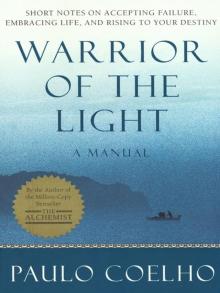 Manual of the Warrior of Light
Manual of the Warrior of Light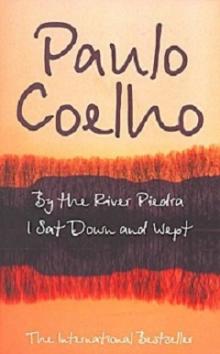 By The River Piedra I Sat Down & Wept
By The River Piedra I Sat Down & Wept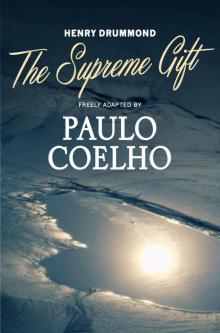 The Supreme Gift
The Supreme Gift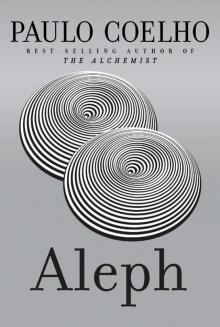 Aleph
Aleph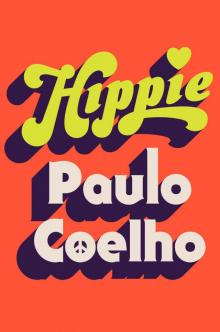 Hippie
Hippie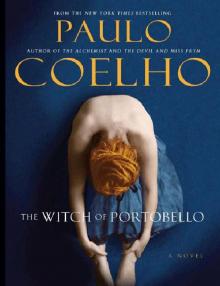 Witch of Portobello
Witch of Portobello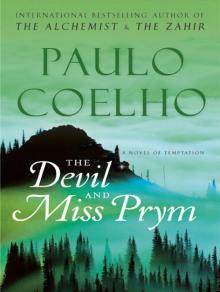 The Devil and Miss Prym
The Devil and Miss Prym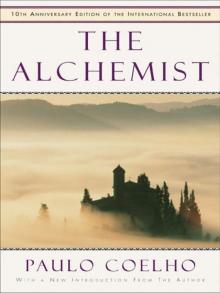 The Alchemist - 10th Anniversary Edition
The Alchemist - 10th Anniversary Edition The Valkyries
The Valkyries